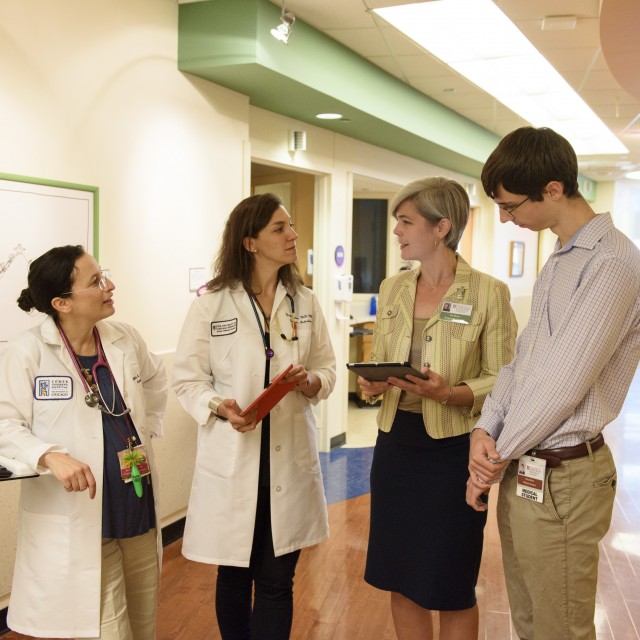1. Faculty on the School of Medicine (SOM) track are judged on the entirety of their contributions to the BSD and University in the three primary missions. Unlike in the BSD track, there are multiple pathways to advancement (including those culminating in a tenured appointment on the BSD track).
2. With rare exceptions (see vii), contributions to the patient care and educational missions are required on these pathways. Some faculty on the SOM pathways will lead programs devoted to traditional scholarship i.e. the creation of knowledge. Others will enhance the intellectual life of the BSD by contributing to its scholarly and educational missions. These academic activities may appropriately take a broad range of forms depending on clinical obligations and the ability to obtain funds to support these activities:
- Research studies that result in peer-reviewed publications in high-quality specialty journals and/or with peer-reviewed funding. A range of research is appropriate including research that seeks to advance the practice of medicine, outcomes and health services research, community based research, research in education, etc.
- peer-reviewed publications as part of a research team or collaboration; co-I; some % effort on grants
- case studies
- presentations in clinical conferences, grand rounds, etc.
- scholarly support of clinical trials
- success in obtaining K-level funding
- Production of scholarly teaching materials (demonstrating incorporation of latest findings into education)
- Teaching or training demonstrating incorporation of latest findings into education
- Evidence-based formulation of research, educational, and clinical policy at a local, regional, or national level
- service on study sections, examining Boards, as scholarly editors, etc. involving the application of current expertise in an area of knowledge
- educational scholarship, incorporating appropriate methods to assess impact of innovative curricula and dissemination of results
- evidence-based improvements in institutional clinical practices
- enrolling patients in clinical trials; technical assistance with others' research
- support of 'scholarship infrastructure' (e.g., maintaining rapport with community organizations, which is necessary for community-based scholarship)
- other contributions with great value to BSD, UCMC, and/or the University; e.g. building and maintaining relationships with community organizations to facilitate community-engaged scholarship
3. Except as in 7, to be appointed on these pathways faculty must have undergone rigorous clinical training in their chosen fields and demonstrate the potential for superior performance in patient care, a desire to practice in an academic setting such as the University of Chicago, and to participate in our educational mission and scholarly activities. Clinicians are defined as faculty who provide direct patient care, practice veterinary medicine, or directly support the provision of patient care. Examples of the latter include directors and faculty who work in clinical laboratories, physicists designing radiation doses, engineers creating equipment or programs used in clinical practice, and clinical informaticists.
4. Appointment and promotion to associate and full professor will consider the total of the contributions of the faculty member in the three missions, and weight these contributions in proportion to the time spent on each mission** See Footnote at the end of this document. Weighting will therefore adjust the level of the contributions and corresponding expectations without compromise in the quality. Administrative and other academic activities as well as citizenship also receive credit. Pathways on which the primary contributions to the BSD are in an administrative capacity are legitimate but administration should not be the only area of contribution.
5. Expectations will reasonably vary from unit to unit/specialty to specialty because the nature of the clinical activity differs. Expectations will also vary with an individual's time allocation, such that expectations for 50% clinical effort should be different than for 90% clinical effort. Clinical activity and quality might be framed in terms of RVUs or other measures in relation to appropriate benchmarks, ability to build a referral practice, etc., as appropriate for circumstances. However the expectations are framed, performance commensurate with promotion should be equally outstanding.
6. Except as in 7, for appointment as and promotion to associate and full professor on the SOM pathways, faculty are expected to be outstanding clinicians in their respective fields, and to be competent to provide a level of care that is unambiguously at the highest level. If appropriate to the nature of their practice at the time that appointment or promotion is being considered, opinions on clinical performance will be gathered from senior faculty members and other physicians and/or health professionals and trainees who have interacted with the candidate and can judge his/her abilities. In some fields they will have sufficient reputation that they receive referrals of challenging clinical problems from physicians and other institutions in Chicago and regionally. Where referral is not customary (e.g. radiology, pathology, anesthesiology), evaluation of clinical excellence also includes recognition of superior performance of consultative services (intensive care units, interventional radiology, etc.). Evidence of productive clinical activity (clinical volumes and revenue) in comparison to benchmarks will also be considered. Where objective reliable data relating to outcomes are available, these will also be taken into account.
7. In exceptional circumstances, faculty on the SOM track may have no clinical responsibilities. These non-clinicians might include, for example: (a) a researcher whose principal value to the institution is as a facilitator of team science, or (b) one whose primary mission is to develop, organize, and deploy major educational programs, or (c) one who plays a leadership role in developing and maintaining the research infrastructure of the BSD. The job description of these faculty must be different from that of faculty on the BSD track and their initial appointment must be on this track except under the circumstances described above in xii under the BSD track. Promotion of appointees under this provision will consider the quality of performance of duties, the impact on the institution, and whether the value to the institution warrants a continued appointment.
8. Excellence in education and institutional citizenship are important considerations for promotion on all SOM pathways.
Learn more about the Appointment, Promotions, Tenure and Benefits:
SOM Track Assistant Professors
SOM Track Associate Professors
SOM Track Professors



